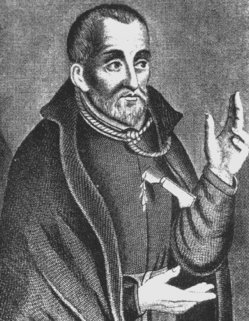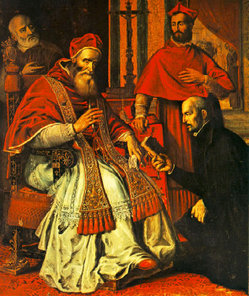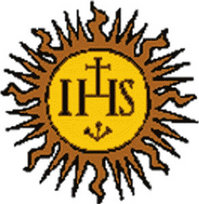In the days following the Octave of Christian Unity the news-better, rumor- that there is a possible change in relations between Rome and the traditional Anglicans is good news. Yesterday, the Australian online news service, The Record, published the following article on some very key movements in Catholic-Anglican relations; some suggest these movements if realized, could lead to full communion and could be as cataclysmic as King Henry VIII’s break from Rome. Indeed, the Church’s work would be a clear desire to be in full, visible communion with those have at the moment imperfect communion. Ut unum sint, the prayer of our Lord, is realizable I believe if we (a) ask the Holy Spirit for the grace to be unified and (b) if we actually work for it. A problem I see is that our church bodies do a lot of talking but resolve little in reality. All these dialogues, all the money spent, all the time used up seems to be a colossal waste at face value. At least that is the picture on this side of the desk. I am confident that the Pontifical Council for Promoting Christian Unity and Centro Pro Unione (to name two key organizations) are doing lots of great work (my certainty is based on the fact that I know some of the people involved). But one of these days I’d like to see a pay-out on the investment. As does the Church hopes, I, too, would like to see the Holy Spirit bring us together in my lifetime. AND wouldn’t this be a great thing to rejoice in during the Year of Saint Paul????!!!!!
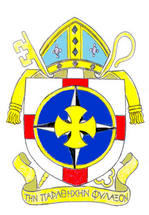 History may be in the making. It appears Rome is on the brink of welcoming close to half a million members of the Traditional Anglican Communion into membership of the Roman Catholic Church, writes Anthony Barich. Such a move would be the most historic development in Anglican-Catholic relations in the last 500 years. But it may also be a prelude to a much greater influx of Anglicans waiting on the sidelines, pushed too far by the controversy surrounding the consecration of practising homosexual bishops, women clergy and a host of other issues.
History may be in the making. It appears Rome is on the brink of welcoming close to half a million members of the Traditional Anglican Communion into membership of the Roman Catholic Church, writes Anthony Barich. Such a move would be the most historic development in Anglican-Catholic relations in the last 500 years. But it may also be a prelude to a much greater influx of Anglicans waiting on the sidelines, pushed too far by the controversy surrounding the consecration of practising homosexual bishops, women clergy and a host of other issues.
The Vatican’s Congregation for the Doctrine of the Faith has decided to recommend the Traditional Anglican Communion be accorded a personal prelature akin to Opus Dei, if talks between the TAC and the Vatican aimed at unity succeed, it is understood.
The TAC is a growing global community of approximately 400,000 members that took the historic step in 2007 of seeking full corporate and sacramental communion with the Catholic Church – a move that, if fulfilled, will be the biggest development in Catholic-Anglican relations since the English Reformation under King Henry VIII.
TAC members split from the Canterbury-based Anglican Communion headed by Archbishop Rowan Williams over issues such as its ordination of women priests and episcopal consecrations of women and practising homosexuals.
The TAC’s case appeared to take a significant step forwards in October 2008 when it is understood that the CDF decided not to recommend the creation of a distinct Anglican rite within the Roman Catholic Church – as is the case with the Eastern Catholic Churches – but a personal prelature, a semi-autonomous group with its own clergy and laity.
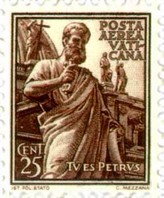 Opus Dei was the first organisation in the Catholic Church to be recognised as a personal prelature, a new juridical form in the life of the Church. A personal prelature is something like a global diocese without boundaries, headed by its own bishop and with its own membership and clergy.
Opus Dei was the first organisation in the Catholic Church to be recognised as a personal prelature, a new juridical form in the life of the Church. A personal prelature is something like a global diocese without boundaries, headed by its own bishop and with its own membership and clergy.
Because no such juridical form of life in the Church had existed before, the development and recognition of a personal prelature took Opus Dei and Church officials decades to achieve.
An announcement could be made soon after Easter this year. It is understood that Pope Benedict XVI, who has taken a personal interest in the matter, has linked the issue to the year of St Paul, the greatest missionary in the history of the Church.
The Basilica of St Paul outside the Walls could feature prominently in such an announcement for its traditional and historical links to Anglicanism. Prior to the English Reformation it was the official Church of the Knights of the Garter.
The TAC’s Primate, Adelaide-based Archbishop John Hepworth, told The Record he has also informed the Holy See he wants to bring all the TAC’s bishops to Rome for the beatification of Cardinal Henry Newman, also an Anglican convert to the Catholic Church, as a celebration of Anglican-Catholic unity.
Although Cardinal Newman’s beatification is considered to be likely by many, the Church has made no announcement that Cardinal Newman will be beatified.
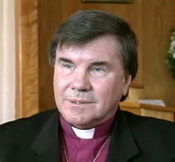 Archbishop Hepworth personally wrote to Pope Benedict in April 2007 indicating that the TAC planned a meeting of its world bishops, where it was anticipated they would unanimously agree to sign the Catechism of the Catholic Church and to seek full union with the Catholic Church.
Archbishop Hepworth personally wrote to Pope Benedict in April 2007 indicating that the TAC planned a meeting of its world bishops, where it was anticipated they would unanimously agree to sign the Catechism of the Catholic Church and to seek full union with the Catholic Church.
This took place at a meeting of the TAC in the United Kingdom. TAC bishops placed the signed Catechism on the altar of the most historical Anglican and Catholic Marian shrine in the UK, the National Shrine of Our Lady of Walsingham in Norfolk, before posting it up in the main street in an effort to gather public support.
Archbishop Hepworth, together with TAC bishops Robert Mercer and Peter Wilkinson, presented the signed items personally to Fr Augustine Di Noia OP, the CDF’s senior ecumenical theologian, on October 11, 2007, in a meeting organised by CDF secretary Archbishop Angelo Amato.
Bishop Mercer, a monk who is now retired and living in England, is the former Anglican Bishop of Matabeleland, Zimbabwe. Bishop Wilkinson is the TAC’s diocesan bishop in Canada.
TACs Canadian Bishop Peter Wilkinson has close ties to the Catholic hierarchy in British Columbia, which has also met the CDF on the issue. He has already briefed Vancouver archdiocesan priests.
One potential problem for the Holy See would be the TAC’s bishops, most of whom are married. Neither the Roman Catholic nor Eastern Catholic churches permit married bishops.
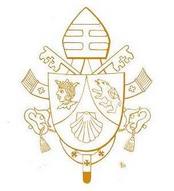 Before he became Pope, Cardinal Joseph Ratzinger discussed the issue of married bishops in the 1990s during meetings of the Anglican Roman Catholic International Commission exploring unity, before the Anglican Church’s ordination of women priests derailed it.
Before he became Pope, Cardinal Joseph Ratzinger discussed the issue of married bishops in the 1990s during meetings of the Anglican Roman Catholic International Commission exploring unity, before the Anglican Church’s ordination of women priests derailed it.
One former Anglican priest who became a Catholic priest told The Record that, along with the Eastern Churches, which have the same sacraments and are recognised by Rome.
The TAC’s request is the closest any section of the Anglican Church has ever come to full communion with Rome because the TAC has set no preconditions. Instead it has explicitly submitted itself entirely to the Holy See’s decisions.
Six days prior to the October 11 meeting between TAC bishops and the Holy See – on October 5 – the TAC’s bishops, vicars-general of dioceses without bishops, and theological advisers who assisted in a plenary meeting signed a declaration of belief in the truth of the whole Catechism of the Catholic Church.
The declaration said, in part: “We accept that the most complete and authentic expression and application of the Catholic faith in this moment of time is found in the Catechism of the Catholic Church and its Compendium, which we have signed, together with this letter as attesting to the faith we aspire to teach and hold.”
Statements about the seriousness of the division between the Anglican Communion and the Catholic Church caused by issues such as the ordination of women priests were emphasised at the wordwide Lambeth Conference held in the UK in 2008.
At the conference, three Catholic cardinals – Walter Kasper, president of the Pontifical Council for Promoting Christian Unity, the Archbishop of Westminster Cormac Murphy-O’Connor and the Prefect for the Vatican’s Congregation for the Evangelisation of Peoples, Ivan Dias, the Pope’s personal envoy, all addressed the issue.
Cardinal Dias, who favours welcoming traditionalist Anglicans into the Catholic Church, bluntly told the Anglican Communion’s 650 bishops that they are heading towards “spiritual Alzheimer’s”and “ecclesial Parkinson’s”.
“By analogy, (Alzheimer’s and Parkinson’s) symptoms can, at times, be found even in our own Christian communities. For example, when we live myopically in the fleeting present, oblivious of our past heritage and apostolic traditions, we could well be suffering from spiritual Alzheime’s. And when we behave in a disorderly manner, going whimsically our own way without any co-ordination with the head or the other members of our community, it could be ecclesial Parkinson.”
Cardinal Kasper warned Anglican bishops that Rome would turn to smaller ecumenical communities if the Anglican Communion at large proved unapproachable ecumenically.
This is bad news for the Anglican Communion, but good news for the TAC.
